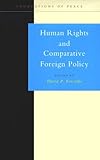Human Rights and Comparative Foreign Policy David P. Forsythe
Material type: TextLanguage: English Publication details: Manas Publications New Delhi Tokyo 30 May 2000Edition: 1st.edDescription: ix, 365 p.; 24 cm. ; 16.15 x 2.03 x 23.75 cmISBN:
TextLanguage: English Publication details: Manas Publications New Delhi Tokyo 30 May 2000Edition: 1st.edDescription: ix, 365 p.; 24 cm. ; 16.15 x 2.03 x 23.75 cmISBN: - 9789280810332
- 341.481 FOR
| Item type | Current library | Call number | Materials specified | Status | Date due | Barcode | |
|---|---|---|---|---|---|---|---|
 Books
Books
|
Rashtriya Raksha University | 341.481 FOR (Browse shelf(Opens below)) | Available | 1488 |
Human Rights and Comparative Foreign Policy is the first book in English to examine the place of human rights in the foreign policies of a wide range of states during contemporary times. The book is also unique in utilizing a common framework of analysis for all 10 of the country or regional studies covered. This framework treats foreign policy as the result of a two-level game in which both domestic and foreign factors have to be considered. Leading experts from around the world analyze both liberal democratic and other foreign policies on human rights. A general introduction and a systematic conclusion add to the coherence of the project. The authors note the increasing attention given to human rights issues in contemporary foreign policy. At the same time, they argue that most states, including liberal democratic states that identify with human rights, are reluctant most of the time to elevate human rights concerns to a level equal to that of traditional security and economic concerns. When states do seek to integrate human rights with these and other concerns, the result is usually great inconsistency in patterns of foreign policy. The book further argues that different states bring different emphasis to their human rights diplomacy, because of such factors as national political culture and perceived national interests. In the last analysis states can be compared along two dimensions pertaining to human rights: extent to which they are oriented toward an international rather than national conception of rights; and extent to which they are oriented toward international rather than national action to protect human rights.
This work argues that different states bring different emphases to their human rights diplomacy, because of such factors as national policy culture and perceived national interest. The authors note the increasing attention given to human rights issues in contemporary foreign policy.
There are no comments on this title.

